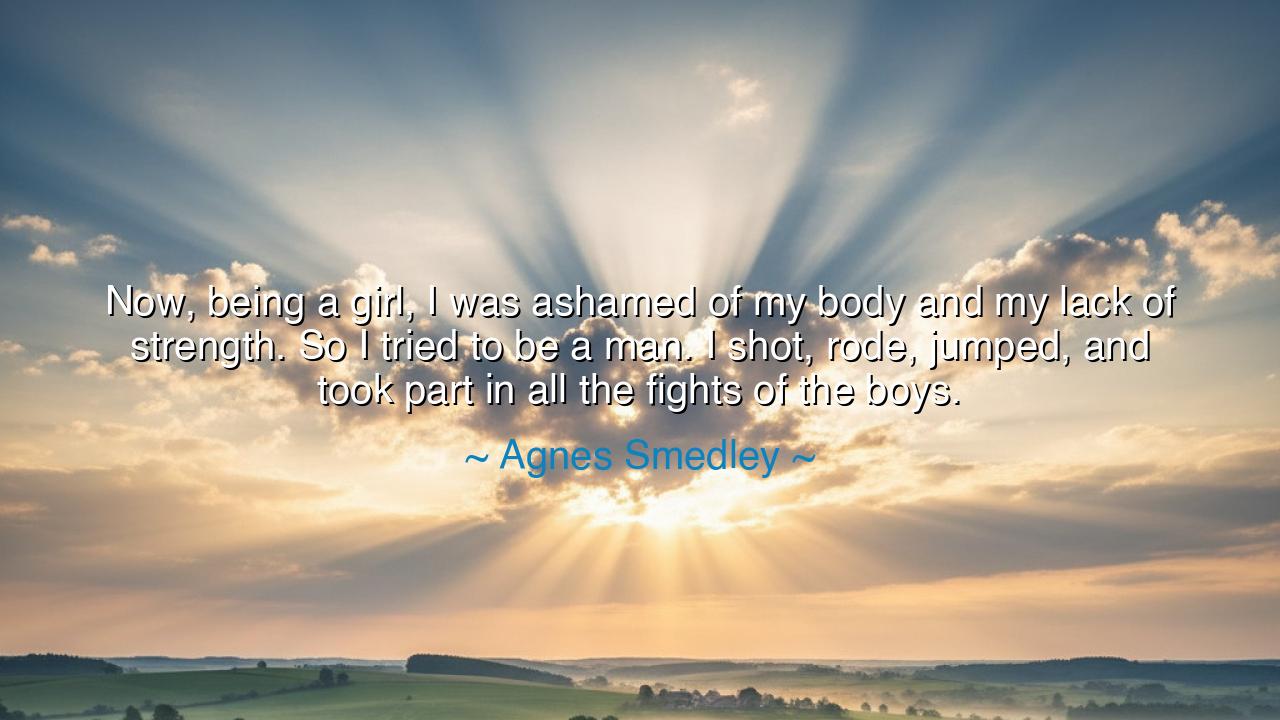
Now, being a girl, I was ashamed of my body and my lack of
Now, being a girl, I was ashamed of my body and my lack of strength. So I tried to be a man. I shot, rode, jumped, and took part in all the fights of the boys.






The words of Agnes Smedley rise from the depths of struggle and longing: “Now, being a girl, I was ashamed of my body and my lack of strength. So I tried to be a man. I shot, rode, jumped, and took part in all the fights of the boys.” These words are not merely a confession of childhood—they are a window into the battle faced by women across ages, a battle not only against the world but against the shame forced upon them by a society that prized one kind of strength and silenced another.
To be born a girl in Smedley’s time was often to inherit chains invisible but heavy. The world told her that the body of a woman was weaker, less noble, less worthy of freedom and daring. The world told her that courage and adventure belonged only to men. Yet rather than submit to these boundaries, she strove to break them, to master the arts of riding, shooting, and fighting. Her words echo with both sorrow and defiance: sorrow that she felt she must deny her own body, defiance that she dared to step into forbidden fields of courage.
Her shame was not her own making, but the creation of an unjust order. Yet in wrestling with it, she uncovered a truth: strength is not confined to the form of a man. By entering the arena of boys, she proved to herself and to others that a woman could be fierce, daring, unbroken. In this, her story reflects the struggles of countless women who challenged boundaries—sometimes by imitating men, sometimes by revealing that their own womanhood held power unknown to men.
History bears witness to others who carried this burden. Joan of Arc, a peasant girl, donned the armor of men to lead armies, because the world of her time could not conceive of a female warrior. She fought, rode, and endured as Smedley did, defying shame by stepping into roles society denied her. And though she was condemned for breaking those bounds, her fire burned so brightly that even death could not silence her. She became a symbol for all generations that courage knows no gender.
The deeper meaning of Smedley’s words lies in this: when society denies dignity to one’s true self, one may be driven to mimic another form of power in order to survive. She “tried to be a man” not because she hated her womanhood, but because the world left her no other path to respect. Yet in doing so, she revealed a universal truth: that strength is not male or female—it belongs to the soul that dares, that resists, that rises.
The lesson for us is clear: never let shame, whether of body or identity, silence your spirit. If the world defines strength too narrowly, expand it. If it says you cannot, prove that you can. But above all, learn that your worth is not in becoming someone else, but in claiming the fullness of your own self. For Smedley’s struggle teaches us that the path to freedom begins with defiance, but it ends with acceptance—acceptance that all bodies, all identities, carry strength in different but equal forms.
Practical action lies before you. Challenge the voices that tell you your form is weak, your role unworthy, your spirit less valuable. Train yourself—yes, in body, in mind, in skill—but also in love for who you are. Encourage others, especially the young, to see strength not in the narrow image of one gender or one body, but in courage, resilience, and integrity. In this way, you carry forward Smedley’s fire, not by erasing the self, but by honoring it.
So let her words be remembered not only as the confession of one girl’s shame, but as the cry of defiance that belongs to all who have been told they are less. For strength is not the birthright of men alone. It is the inheritance of all souls who dare to rise, who dare to fight, who dare to live fully—whether in armor, or in their own true skin.






AAdministratorAdministrator
Welcome, honored guests. Please leave a comment, we will respond soon